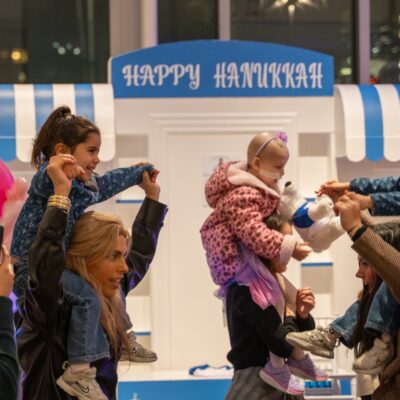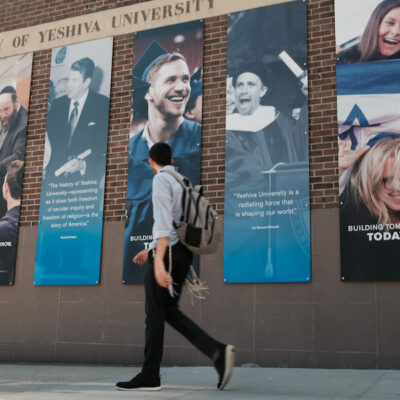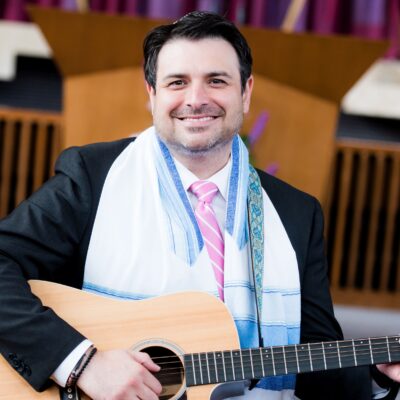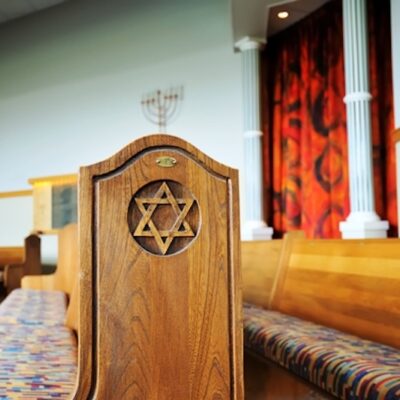Opinion
WE HAVE HISTORY
Why Jewish people should care about the appointment of the pope
When I started a degree in Judaic studies, I didn’t expect to spend so much time learning about the Catholic Church. I quickly realized, however, that to study Jewish history without Christianity, especially without the Catholic Church, is to leave out the world in which we lived — and often just survived — for centuries.
Judaism has never existed in a vacuum. As a minority tradition, we have continually adapted to the realities of living under majority rule; and one of those realities, for much of our history, was living under the reach, pressure or moral authority of the Church.

Francesco Sforza - Vatican Media via Vatican Pool/Getty Images
Newly elected Pope Leo XIV, Robert Prevost addresses the crowd on the main central loggia balcony overlooking St Peter's Square on May 08, 2025 in Vatican City.
And the Catholic Church’s influence stretched far beyond theology. It shaped borders, laws and daily life. It dictated where Jews could live, what trades we could enter and whether we could walk the streets safely. It sanctioned expulsions, enforced conversions, and gave spiritual cover to violence. More than once, the pope’s word was the difference between a protected Jewish community and a devastated one.
For centuries, the Church’s theology taught that Jews were not only misguided but spiritually guilty, responsible for the death of Jesus. This became known as the deicide charge: the accusation that Jews had killed God — not just the people alive at the time, but all Jews, everywhere, for all time. This single idea laid the groundwork for nearly 2,000 years of Christian antisemitism, passed down through sermons, prayer books and policy. It painted Jews as dangerous and cursed, an image that seeped into law and culture across Europe.
The Crusades were launched in the name of God, but Jewish communities were often their first targets. In 1096, long before the crusaders reached Jerusalem, they attacked Jewish towns along the Rhine River, massacring entire communities. These weren’t lawless mobs; these were men acting on religious fervor, empowered by sermons and convinced that killing nonbelievers at home was just as holy as fighting them abroad. Pope Urban II, who called for the First Crusade, never spoke out against the slaughter. That silence mattered then; it matters still.
Throughout the medieval period, the Church alternated between protecting and persecuting Jews. In 1215, the Fourth Lateran Council, led by Pope Innocent III, required Jews to wear distinguishing clothing. The Spanish Inquisition, authorized by papal decree, hunted down Jews who had converted to Christianity but were suspected of secretly practicing Judaism. In Italy, Jews were forced into ghettos by papal order, and in Rome itself they had to attend conversion sermons. These events weren’t anomalies. They were policies.
Historically, Christianity often cast Judaism as something stuck in the past — a broken version of faith. The reality, however, is that Judaism is alive. Ours is a tradition of commentary, creativity, argument and reinvention. We take the ancient and the modern and braid them together; the Passover Seder, for example, reflects structures of the Greco-Roman symposium, but it tells an entirely Jewish story.
Which brings us to the pope.
In modern times, the pope may no longer rule over kings and countries, but he remains one of the most powerful religious voices in the world. The pope speaks to over 1.4 billion Catholics. The Church operates schools, hospitals, universities, charities and humanitarian organizations around the globe. In fact, the Catholic Church is one of the largest charitable organizations in the world, distributing billions annually to support the poor, provide disaster relief and fund healthcare, education and refugee aid. That matters, because wherever vulnerable people exist, the Church often shows up first — and how it shows up can change lives. Its priorities become policy. Its values become action. Its silence, or compassion, can ripple outward on a global scale.
So when the pope speaks, or doesn’t speak, the world notices. And so do we.
During the Holocaust, Pope Pius XII famously remained silent in public. Whether out of diplomatic caution or fear of Nazi retaliation, he never clearly condemned the Nazi genocide. In Vatican City, an independent city-state, there were no roundups. No trains. No ghettos. But that’s because there were no Jews there to round up. The pope watched the world burn from behind Vatican City’s walls, and said very little.
But that is not the end of the story.
In 1965, the Church issued a document called “Nostra Aetate,” “In Our Time.” For the first time, it rejected the deicide charge. It condemned antisemitism. It affirmed that God’s covenant with the Jewish people had not been broken.
It didn’t erase the past, but it changed the direction of the future.
Since then, popes have taken meaningful steps toward repair. Pope John Paul II visited synagogues, met with Holocaust survivors and called Jews “our elder brothers.” Pope Benedict XVI, born in Nazi Germany, continued that work. Pope Francis, who led the Church beginning in 2013, met regularly with Jewish leaders, condemned antisemitism unequivocally and prioritized healing. His comments on Jewish law were not always perfect, but he engaged sincerely with criticism and reaffirmed his respect. His presence at Jewish sites like the Western Wall and Yad Vashem shifted the tone of Catholic–Jewish relations.
And then, as of May 8, 2025, the world welcomed a new name into this legacy: Pope Leo XIV.
The first American pope. The first Augustinian pope in centuries. A former missionary in Peru. A man shaped by study under leaders involved in Jewish–Catholic dialogue, and also shaped by the theological conservatism of his order. His early statements on LGBTQ+ issues have caused concern. His lack of a clear record on antisemitism leaves questions open. I, like many others, hope we will see compassion take root in his leadership. That he will be more just, more inclusive, more courageous than we fear him to be; and that he will speak clearly, without hesitation, when the world needs moral clarity.
Because even in 2025, we know what silence can cost.
When the white smoke rose from the Sistine Chapel chimney, a traditional sign that a new pope has been chosen, my phone blew up — not from Catholic friends, but from Jewish ones. They wanted to know who the new pope was and whether he’d be good for us.
The papacy still carries weight. It still shapes stories. It still influences how others see us, and how we navigate being Jewish in a world where Christian tradition still dominates cultural power.
There’s something fascinating about the drama of the conclave: the locked doors, the whispered votes, the black smoke and white. It feels distant and theatrical, like when an American watches the coronation of a British monarch. But it’s not just ritual: It’s real power — and for Jewish people, it’s never been just a show. One way or another, it has always shaped our story.
So no, we don’t need the pope to validate us. But we do care what he says, because we remember what it meant when he stayed silent. And because we still believe that words can build a different world.
We hope Pope Leo XIV will be that kind of pope. One who preaches peace, inclusion and courage. One who defends the dignity of LGBTQ+ people, of the poor, of immigrants, of those historically excluded. One who fights antisemitism not as a sidebar, but as a core moral concern.
We hope. And we’ll keep watching.
Stessa Peers is a Jewish educator and historian. She serves as the director of education and youth engagement at Temple Beth Abraham in Tarrytown, N.Y.

 Add EJP on Google
Add EJP on Google









